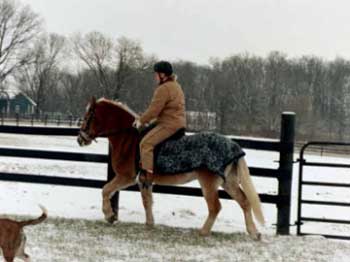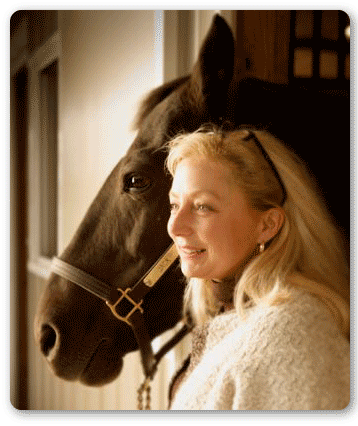Winter Issues

Winter brings snow, ice and cold, all things that will undoubtedly affect your horses, their containment and you. Just as your car and home have special cold weather considerations, so do the equine-related items in your life. Below are a few tips to help you brave winter and come out safely on the other side.
People
- Take stock of your winter gear and ensure it's laundered and in good repair.
- Hand warmers are inexpensive, small pouches that are activated upon opening. They can also be used in shoes, and they stay warm for several hours. Stock up for those extra cold days and keep a few in your trailer or truck for emergencies.
- Cold winter air dries out skin and chaps lips. Keep good quality lotion and chapstick handy.
Horses
- Thoroughly cool down your horse after every workout. Use a cooler to help sweaty horses dry out and stay warm.
- Adjust your horse's diet as necessary. Talk to your local feed store about a winter mix that will keep your horse in good condition.
- If horses are sensitive, have been under lights, have been body clipped, or the cold is extreme, make sure you have clean, well-fitting blankets.
Fencing & Pastures
- Consider using a round-bale feeder or feeding hay for pastures still in use to help fight boredom and provide necessary grazing.
- Make sure pastures and grounds are free of debris that could be made invisible by the first heavy snowfall.
- Check fence lines and make repairs before winter storms and extreme cold make the job tougher.
Barn & Stalls
- Seal up drafty areas, but don't prohibit ventilation. Remember, barns and stalls should have adequate ventilation during all months, without drafts.
- Horses usually spend more time indoors during colder months, so do a good check of each stall for splinters, broken boards, loose nails, etc.
- If your barn has an indoor arena, make sure the footing has been worked and leveled. Consider using a dust down product to help prevent respiratory problems for you and your horse.
- Begin using heated or insulated buckets to keep water free of ice.
- Make sure outdoor waterers and troughs are equipped with heaters.
- Drain hoses after every use.
- Stock up on salt that you can use to keep paths around the barn ice-free.
- Check lighting in the aisles and stalls to make sure everything is in good working order. Replace any bulbs or fixtures that aren't working. Winter months are darker, earlier, so you never know when you might be at the barn after dark.
- If you store any liquid medications or supplements in your barn, move them to a heated area for the winter.
- Stock up on feed and shavings in case you get snowed in.
 Debbie has over 45 years experience with horses and equine-related businesses. She has owned, trained, boarded horses and run stables at various times in her career. She is a certified fence installer, has given balanced riding lessons, and has shown horses in Western, Western Pleasure, Trail, English, Hunter/Jumper, Fox Hunting, Hunter Trials, Dressage and driving classes. Debbie has been involved in foaling, and just about every aspect of horse ownership possible, and she welcomes your questions and comments. If you are interested in using any articles by Debbie, please send her an email.
Debbie has over 45 years experience with horses and equine-related businesses. She has owned, trained, boarded horses and run stables at various times in her career. She is a certified fence installer, has given balanced riding lessons, and has shown horses in Western, Western Pleasure, Trail, English, Hunter/Jumper, Fox Hunting, Hunter Trials, Dressage and driving classes. Debbie has been involved in foaling, and just about every aspect of horse ownership possible, and she welcomes your questions and comments. If you are interested in using any articles by Debbie, please send her an email.
RAMM Fence Systems, Inc. makes every effort to provide reliable and useful information on horse health, care and products. The statements made on this website are based on years of experience with horses, however, they are based on generalized situations and should not replace diagnosis or treatment by a veterinarian or consultation by a professional. RAMM Fence Systems, Inc. does not assume any legal responsibility. Readers should always consult qualified health care providers for specific diagnosis and treatment.
